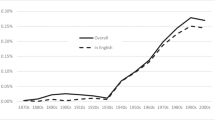Summary
In this article the author attempts to bridge the gulf between philosophy and economics by tracing the development of two philosophical time concepts in economic science. First the concept of transcendental time connected since the Greeks with ideas about natural laws is discussed and the breakthrough of this concept into economics in the works of the Thomists and the Physiocrats. Secondly the author deals with the concept of immanent time and its influence on the economic thinking of the later members of the historical school in Germany (Sombart and Max Weber). This evolution of time concepts in economics has been accompanied by different views on ‘economic laws’. Originally these were interpreted as nature-oriented, metaphysical laws, which are called transcendental apriori's. Later on, especially in the thinking of the classical economists, these laws were regarded as the ultimate starting-points of economic reasoning; in so far they have this meaning they are called cognitive apriori's. The concept of immanent time resulted in the ‘verstehende Methode’. The author emphasizes the fact that the two time concepts have always been closely related with ideas about scientific methods: that of transcendental time with the search for premises which embody the ultimate causes of economic phenomena; that of immanent time with investigations layingstress on the historically relative character of those phenomena. The immanent method contributed to the greater differentiation and subjectivation of the premises which for a long time were used in economic theory and also to the development of a specific economic time concept. This concept comprises the abstract theoreticalperiod as well as its practical counterpart, theterm, which is used in empirical analysis in order to determine the factual length of these periods.
Similar content being viewed by others
Additional information
Op deze plaats wil ik gaarne mijn grote erkentelijkheid uitspreken jegens prof. dr. P. Hennipman, prof. mr. dr. K. Kuypers, prof. dr. H. A. J. F. Misset, mevr. drs. E. M. Barth, drs. J. H. Brussee, drs. J. P. J. Fit en drs. H. Leliveld die mij bij het schrijven van dit artikel met raad en daad terzijde hebben gestaan.
Rights and permissions
About this article
Cite this article
Broekman, F. Filosofische tijbegrippen in de economische wetenschap en het tijdaspect der economische verschijnselen. De Economist 118, 619–660 (1970). https://doi.org/10.1007/BF02142837
Issue Date:
DOI: https://doi.org/10.1007/BF02142837




